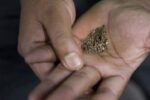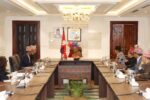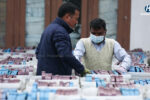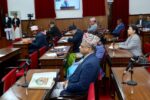KAILALI: Kannu Ram Chaudhary, a daily wage earner, lives in a freed Kamaiya camp at Godavari-5, Kailali. His family was enthralled to see him enter the home on March 23 with rice and pulses for two meals. They had a good sleep that night.
When he set out for work on March 24, he was surprised to see uneasy silence. There were no vehicles on the road. Upon inquiring, he realized that the government had enforced a lockdown to curb the spread of the coronavirus pandemic.
Kannu was in trouble. He had neither work nor food at home. There was little money with him. He went to the market with the money but returned home disappointed as not a single shop was open.
Rather, he was chased by the police. That evening his family went to bed without food. The next few days were spent “borrowing” from his neighbors and other generous people. When he got none to feed his family, they went to bed without food.
One month after the lockdown, Kannu Ram, like many families with a similar fate, received 10 kg of rice from the ward office. All squatters like Kannu Ram, squeezed by hunger and debt, had to wait for a month to get 10 kg rice and some pulses.
“We suffered a lot during the lockdown. Who cares about poor people!” Kannu Ram narrated his grief, “There was none to ask us if we had anything to eat. I was more afraid of death by starvation than the disease.”
He dreaded the family could end in starvation.
Distress of the poor
The second confirmed case of coronavirus in Nepal was a man from Dhangadhi-5. He was diagnosed with coronavirus positive after returning from Dubai. It was natural for the community to fear spread as he was found positive after he came and lived in the same community.
Everyone was afraid of the coronavirus pandemic. The police, administration and locals were involved in controlling the infection.
People were facing two perplexing situations together — the fear of coronavirus pandemic and the fear of starvation as the low-income group and poor workers had nothing to eat.
The strict lockdown that confined people to their homes for three months left the daily wage earners without money, work and food. Along with them, people with disabilities, athletes and many others with no savings at all suffered a lot.
Jeet Bahadur Malla, the Secretary of Free Transport Workers’ Union said many workers in the transport sector were exposed to further hardship due to the coronavirus pandemic.
“After the hotels and shops were closed the workers were forced to stay in their vehicles,” Malla told Khabarhub, “The drivers and co-drivers of the buses could not go home from Terai; after few days without meal they reached the hotels of their contact. They had to pass many days without a meal.”
Relief distribution only for publicity
Relief distribution from the government and non-government sectors began nearly after a month of the lockdown.
By then, most of the people in distress had covered hundreds of miles on foot, starving themselves to death to reach home.
Even at home, there was no food, so they rushed for relief. Although the ward offices distributed relief, those who did not belong to that particular area did not get the relief. Many organizations fed such stranded workers by soliciting donations.
The players also fared no better fate due to lockdown. As there were no sports events, they lost their source of income as well. They are still unemployed.
People with disabilities suffered further. When the caregiver lost their job, the people with disabilities suffered further.
“Lockdown induced situation was too tough for people with disabilities. What’s more, neither the quarantines nor the isolation centers were disability friendly,” Bhavani Ayre, the President of Disability Assistance Foundation Nepal, shared their difficulties, “Neither the government nor anyone else thought about them.”
The federal and provincial governments claimed to have spent millions of rupees on relief. The local levels also claimed the bills of millions of rupees spent in relief distribution, but the relief offered to the poor was hardly enough for a week. The starving people got hardly five to ten kilograms of rice in relief.
Poor health care services
Dhangadhi folks were further panicked when the second case was found there. An isolation center was set up in Seti Provincial Hospital, but the ambulance refused to take the COVID patient to the isolation center.
Finally, when the ambulance driver took the patient to the center, the medics hesitated to go near the patient.
The medics went closer to the patients only after getting the coronavirus safety kits.
Sudur Paschim Province which was panicked witnessing one case in March has seen more than 10,000 coronavirus cases now.
The first few patients received good care from the health workers, when COVID cases hiked the patients were advised to stay at quarantine.
Those who returned from India were kept in quarantine. There was no PCR machine in the whole province. Swabs were collected and sent to Kathmandu for tests and sometimes, the people had to wait for nearly a month to get the test report.
Now, there are six PCR machines in Sudur Paschim Province. The report of the swabs collected today comes within 24 hours. All local levels have made a separate structure for isolation.
“There is a separate COVID Hospital of 50 beds, the local levels have arranged to keep the people with minor symptoms at their isolation centers at the local levels,” Guna Raj Abasthi, the Director of Province Health Directorate of Sudur Paschim Province told Khabarhub, “besides, the coronavirus patients with no symptoms are advised to stay at home isolation.”
There are 13 ventilators in Seti Provincial Hospital now. The people with critical health conditions receive treatment on ventilators.
Dilip Kumar Shrestha, the information Official at Seti Provincial Hospital says that there will be a shortage of ventilators if the number of coronavirus cases increases.
Culmination of Social Abuse
Coronavirus patients have suffered worse social exclusion. Even after the recovery from the pandemic suffering they are not accepted easily.
Bibek BK of Lamkichuha Municipality, Kailali returned from India, tested coronavirus positive after spending 14 days in quarantine, spent two weeks in the hospital again, and after recovery went home.
When reached home, not only the community members, his family members also regarded him as a carrier of coronavirus in the village.
“For months they humiliated me as a carrier of coronavirus,” he narrated his experience, “now only the situation is turning normal.”
Dinesh Chaudhary of Dhangadhi-7 also tested coronavirus positive. He had no symptoms and stayed at home. Yet, he had to go through humiliating treatment from society.
Ruined business
The lockdown enforced to curb and control the coronavirus pandemic has crippled many businesses.
“Many businessmen have fled, as they have to work harder than before to get back to their normal condition, many of them are frustrated,” Puspa Raj Kunwar, the Chairman of Kailali Chamber of Commerce and Industry shared the sad story, “The trade is stalled, we are unable to pay the interest to the bank, we businessmen are hard-hit.”
He pointed out that the persistent lockdown and prohibitory orders issued by the government have shrunk the business sector to a helpless situation.
Kamal Bam, the President of Hotel Entrepreneurs Association Kailali and Padam Saud, Chairman of Private and Boarding School’s Association (PABSON) Kailali also share that they are facing a hard time as well.
“As the schools got closed for seven months we are unable to pay the interest of the loan taken from the bank,” PABSON Chairman Saud told Khabarhub, “We have not been able to pay the teachers as well. Life is getting hell due to pandemic.”
The burden of unemployment
Many people lost their jobs due to lockdown. Some received only half of their salary. Many people had to go unpaid. Sudur Paschim Province alone witnessed nearly 150,000 job losses in the private sector alone. They did not get any source of income for more than three months.
Sudur Paschim could be COVID red zone for various reasons like the long open border with India, a large number of India returnee locals, the low literacy rate, etc.
Birendra Joshi, who worked in a private firm in Dhangadhi had to go on unpaid for four months and many people fared nothing better than him.
The government’s presence
When the government endorsed lockdown to mitigate the coronavirus pandemic, everyone dreaded the pandemic would spread in Sudur Paschim.
Thousands of people of Sudur Paschim who had gone to India for work were stranded at the border. The people were afraid that the coronavirus would reach all villages.
After finding the cases of coronavirus infection in the returnees from India, the government started working more sincerely.
The government increased the range of PCR tests. The province that did not have any PCR has got six machines now.
Out of them, one was provided by the federal government, three were procured by the province government, one was bought from the private sector and others are procured by local levels.
Similarly, the province which had got five ventilators before have got fifteen ventilators now. There are 13 ventilators in Seti Provincial Hospital and two in others. The Province Health Directorate informed that some ventilators are in the process of being installed.
Not only this, after finding the cases increasing in the province, the government expanded the range of coronavirus test and initiated the provision of distributing relief package to the pandemic victims.
According to the Ministry of Internal Affairs and Law of Sudur Paschim Province, the provincial government has spent more than Rs 420 million on the prevention and control of the coronavirus. Besides, the local levels have also spent from their funds. However, the people complain that they have not got the relief as the authority claims to have distributed.
Cooperation and collaboration has made work easier
Unlike in the situation of other disasters like floods, landslides and earthquakes, the non-government sector’s contribution has been nominal in the relief attempts meant for coronavirus pandemic relief.
The local level found it tough to arrange quarantine as all returnees from India have to be kept in quarantine and the inflow was remarkably high.
The loss of income, risk of disease and being stigmatized by society have resulted in mental problems and even suicides. However, the situation is returning to normalcy.
There have been few support initiatives from the private sectors as well. The PCR machine in Dadeldhura was procured from the private sector. Under the leadership of the Humanity Foundation, various private and government organizations helped in the procurement and installation of a PCR machine in Dadeldhura.
Similarly, Rs 48.73 million was deposited in the Coronavirus Prevention and Control Fund of Sudur Paschim government from the employees, chamber of commerce and industry, banks and other organizations in the province.
Tej Prakash Joshi, the spokesperson at the Ministry of Internal Affairs and Law applauds the role of the private sector and various organizations role in returning the situation to normalcy.
“The horrible situation caused by the pandemic is gradually returning to normalcy,” Spokesperson Joshi told Khabarhub, “It has been all due to the cooperation and coordination from all sectors.”









Comment